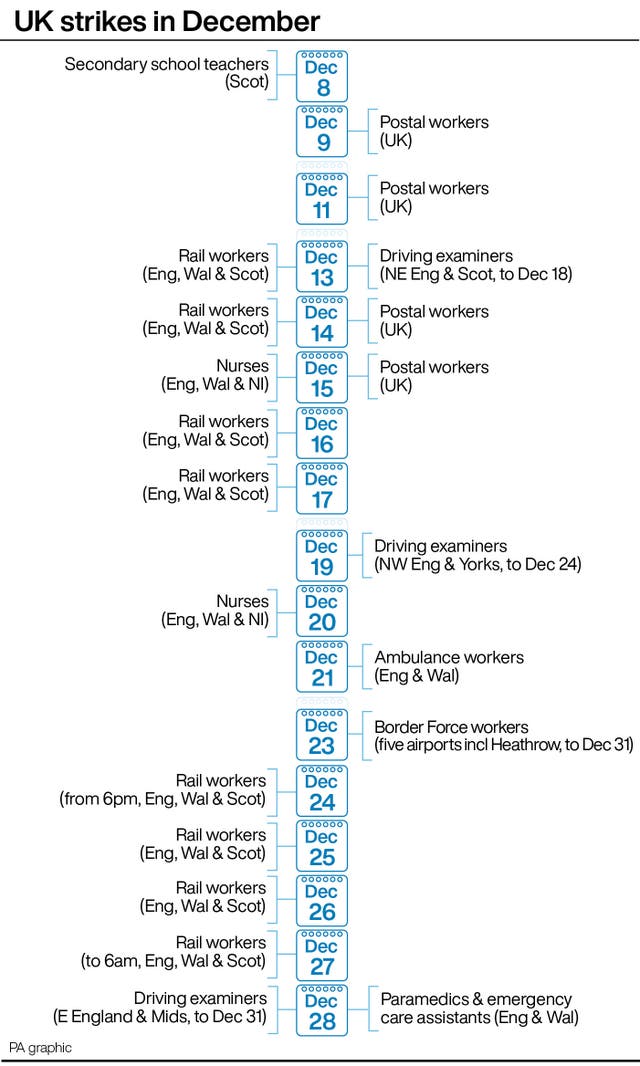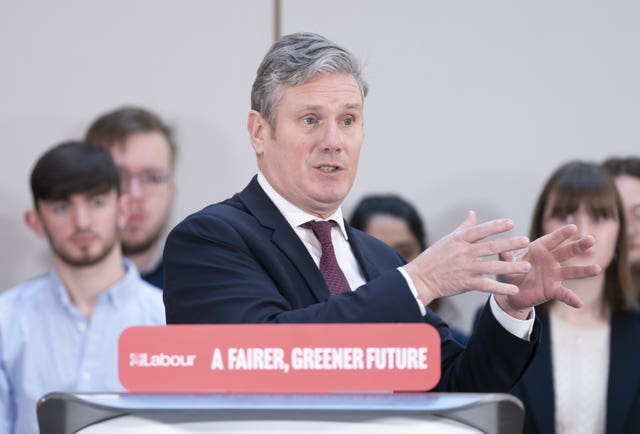
Shelagh Fogarty 1pm - 4pm
7 December 2022, 16:34

There is no timetable for much-delayed legislation to require minimum service levels and limit the effects of strikes.
Rishi Sunak has promised “new tough laws” to curb the impact of industrial action as he criticised “unreasonable” union chiefs.
The Prime Minister vowed to “protect the lives and livelihoods” of the public from strike disruption and insisted the Government has been “reasonable” in dealing with public sector pay demands.
Sir Keir Starmer urged Mr Sunak at Prime Minister’s Questions to do more to resolve a growing wave of industrial action, as ambulance and healthcare workers prepare to join rail worker in striking.

The Labour leader pointed to comments from Transport Secretary Mark Harper suggesting long-promised legislation would not address the current round of strikes.
The Prime Minister responded: “Hard-working families right now in this country are facing challenges.
“The Government has been reasonable. It’s accepted the recommendations of an independent pay review body, giving pay rises in many cases higher than the private sector.
“But if the union leaders continue to be unreasonable, then it is my duty to take action to protect the lives and livelihoods of the British public.
“That’s why, Mr Speaker, since I became Prime Minister I have been working for new tough laws to protect people from this disruption.”
He demanded that the opposition leader “stand up for working people” and back the laws.
This would absolutely be the right thing to do by the Prime Minister. We need minimum service levels for key services to protect the public from unions that are inflicting sustained misery in pursuit of inflation-busting pay – the private sector is getting nothing like it. https://t.co/Cs7vmvz9Zu
— Simon Clarke MP (@SimonClarkeMP) December 3, 2022
The new legislation Mr Sunak appeared to be referring to, the Minimum Service Levels Bill, was first promised in 2019 and is currently stalled in Parliament.
Legislation has been put forward, but MPs have not begun debating it.
The Prime Minister is under pressure from Tory MPs to speed up the introduction of the laws, which would ensure that, even during the most disruptive strikes, a certain number of services would still run.
Downing Street later declined to provide a timeline or any details on the new laws Mr Sunak invoked, saying only they were to be brought in “as swiftly as possible”.
The Prime Minister’s official spokesman said Government work on new measures was “ongoing” and that “we want to do it at speed”.
“We keep the powers under review and obviously in light of what we are seeing with effectively rolling strikes, the Prime Minister thinks it is right to push ahead with new powers,” he told reporters.
The official also indicated the action being considered could be extended from imposing minimum service levels on transport to other public services.

Labour will oppose the “unworkable” minimum service levels legislation but a spokeswoman would not commit to Sir Keir repealing it if he entered No 10.
Asked what action Labour would take on strike laws, the spokeswoman told reporters the party would repeal the “archaic” 2016 laws brought in under the Tories, something which could make it easier for strike ballots to take place.
She said: “We would repeal the 2016 Trade Union Act. There are unnecessary elements in trade union legislation that we would look at … One example would be online balloting, not allowing online balloting, we don’t think that’s practical, we think it’s costly and we think that’s unnecessary.”
Pressed on the proposals from Mr Sunak, the spokeswoman said “we think minimum service legislation would be unworkable” but as the laws had not yet been brought in the party could not commit to repealing them.
TUC general secretary Frances O’Grady accused Mr Sunak of “attempting cheap political pot shots” with his warning about new anti-strike legislation.
She said: “Public sector workers would love to be able to deliver minimum service levels. But 12 years of Conservative cuts and mismanagement have left our public services falling apart at the seams.
“Rather than attempting cheap political pot shots, the Government should be getting around the table and negotiating with unions about pay.”
Earlier, Education Secretary Gillian Keegan said ministers were looking into how they might prioritise provision for vulnerable children in the event of teacher strikes.
Three of the four major teaching unions are currently balloting members on possible industrial action.
Ms Keegan urged teachers not to walk out, stressing the need to keep children in school.
Asked if there were any plans in place to prioritise the most vulnerable pupils during potential strikes, as the Government did during the pandemic, she said: “There’s a lot of planning going on across Government, actually, to mitigate the impact of harmful strike action.
“And that is, of course, one of the factors we’re looking at – how we can do that, relying on various other pools of people and staff. So yes, that’s something that’s part of the planning.”